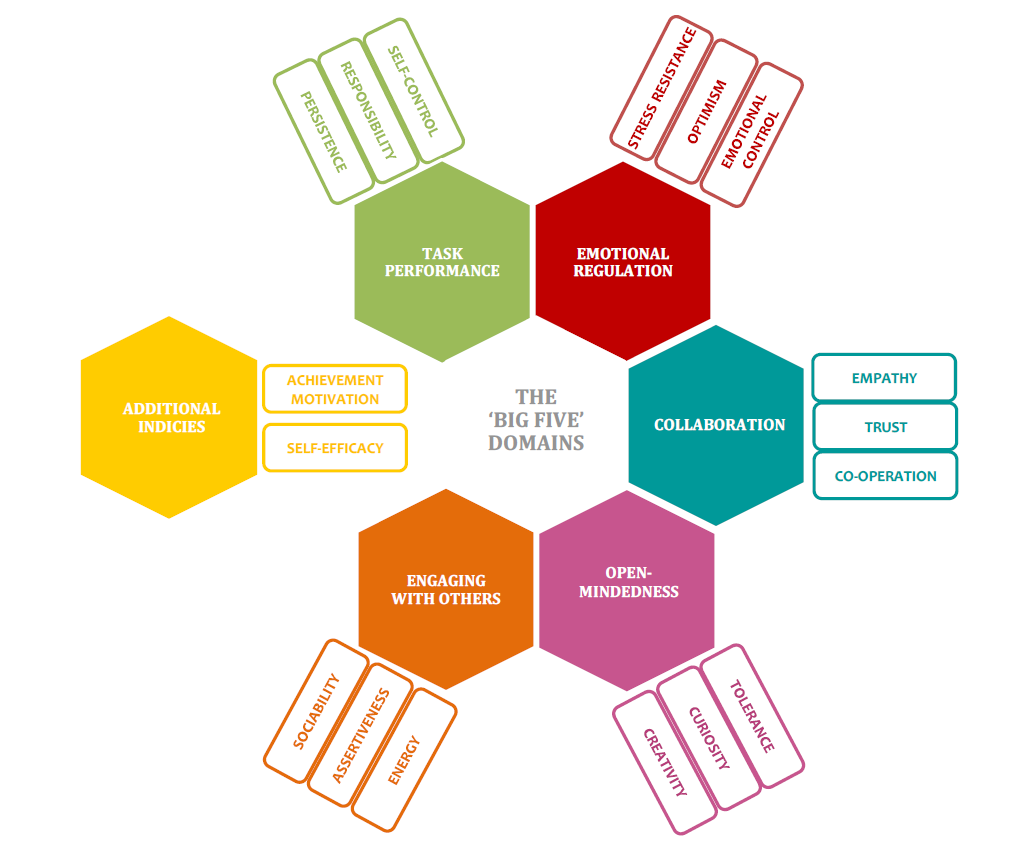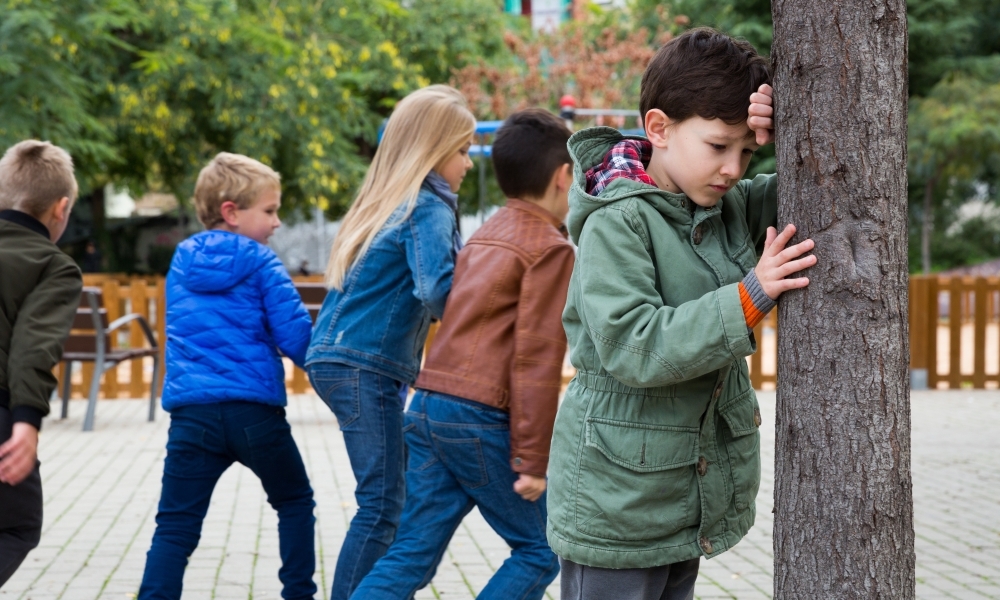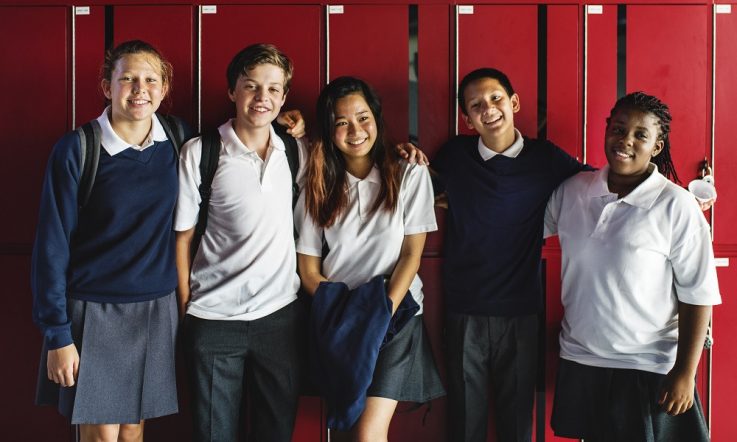Disadvantage hindering social and emotional development
For decades, large-scale international assessments have shown a strong relationship between disadvantage and educational outcomes. This has traditionally focused on socioeconomic differences in cognitive outcomes, such as literacy, numeracy, science, ICT proficiency and other knowledge areas, but more recently, socioeconomic differences have also been found in other domains such as global competence.
However, these assessments may not be capturing the underlying traits that really matter when it comes to student outcomes. According to the Organisation for Economic Cooperation and Development (OECD), ‘children need a balanced set of cognitive, social and emotional skills to adapt to today’s demanding, changing and unpredictable world’ (OECD, 2015).
Research over many years has resulted in a taxonomy of personality factors called the Big Five inventory. It identifies five basic dimensions of personality related to task performance, emotional regulation, engaging with others, collaboration and open-mindedness (Kankaraš & Suarez-Alvarez, 2019). Each dimension includes a number of sub-dimensions, which more clearly describe the associated thoughts, behaviours and feelings.

Figure 1: The OECD Survey of Social and Emotional Skills assessment framework (Kankaraš & Suarez-Alvarez, 2019).
But social and emotional skills, unlike cognitive skills, cannot be directly measured. Instead, personality psychologists primarily measure these skills through self-reported surveys.
The OECD Survey on Social and Emotional Skills (SSES) is one of the first international collections of students’ self-reported skills across the Big Five domains. Led by the Australian Council for Educational Research, the SSES measured the conditions and practices that foster or hinder the development of social and emotional skills among 10- and 15-year-old students.
Data from 3000 students in each age group living in 10 cities around the world were collected in late 2019. Releasing the results in September 2021, the OECD emphasised that socioeconomic status, along with age, gender and migration background, matters when it comes to students’ social and emotional skills.
In all cities participating in the survey, socioeconomically advantaged students reported higher levels of social and emotional skills than their disadvantaged peers. The differences were particularly pronounced in six of the 17 skills being measured: tolerance, curiosity, creativity, empathy, assertiveness and self-efficacy.
Research has shown that young people’s social and emotional skills decline as they enter adolescence (Soto et al., 2011). The SSES confirms that, regardless of socioeconomic background, 15-year-olds report lower social and emotional skills than 10-year-olds on all measures except tolerance and assertiveness.
Interestingly, this age-based decline in students’ social and emotional skills is slightly larger among socioeconomically advantaged students than it is for disadvantaged students. This means the differences in social and emotional skills between advantaged and disadvantaged students are generally smaller for 15-year-olds than for 10-year-olds. The exceptions are, again, tolerance and assertiveness skills, where the socioeconomic gap increased slightly between age 10 and 15.
Addressing the socioeconomic gap in social and emotional skills is important because these skills are strongly related to young people’s psychological wellbeing (Strickhouser et al., 2017). The SSES found a strong association between skills related to emotional regulation and students’ current psychological wellbeing, as measured by how they felt during the previous two weeks.
On average, socioeconomically advantaged students also reported higher levels of psychological wellbeing than disadvantaged students. Among 10-year-olds, the average difference was around 10 percentage points. The difference among 15-year-olds was again smaller, at around five percentage points.
The driving forces behind these socioeconomic differences in students’ social and emotional skills are, as with cognitive outcomes, largely related to the resources available and the home environment. Some research has suggested that parenting style and family structure are potential channels through which parents’ socioeconomic status can affect their children’s social and emotional skills (Deckers et al., 2015).
Schools are therefore important resources for promoting young people’s social and emotional skills and, in turn, psychological wellbeing. This is particularly the case for disadvantaged students, who, otherwise, may have little in the way of support structures available to them.
Understanding which social and emotional skills are related to higher (and lower) levels of psychological wellbeing provides schools and teachers with crucial tools for supporting students. The SSES shows that stress resistance, optimism, emotional control, trust and energy are most strongly associated with higher psychological wellbeing. Providing teachers with training on how to best support their students to improve these skills may therefore be invaluable.
References
Deckers, T., Falk, A., Kosse, F., & Schildberg-Hörisch, H. (2015). How does socio-economic status shape a child's personality? IZA Discussion Papers, No. 8977. Institute for the Study of Labor (IZA). https://www.iza.org/publications/dp/8977/how-does-socio-economic-status-shape-a-childs-personality
Kankaraš, M., & Suarez-Alvarez, J. (2019). Assessment framework of the OECD Study on Social and Emotional Skills. OECD Education Working Papers, No. 207. OECD Publishing. https://doi.org/10.1787/5007adef-en
Soto, C. J., John, O. P., Gosling, S. D., & Potter, J. (2011). Age differences in personality traits from 10 to 65: Big Five domains and facets in a large cross-sectional sample. Journal of Personality and Social Psychology, 100(2), 330-348. https://doi.org/10.1037/a0021717
Strickhouser, J. E., Zell, E., & Krizan, Z. (2017). Does personality predict health and well-being? A metasynthesis. Health Psychology, 36(8), 797–810. https://doi.org/10.1037/hea0000475
OECD. (2015). Skills for Social Progress: The Power of Social and Emotional Skills. OECD Skills Studies. OECD Publishing. https://doi.org/10.1787/9789264226159-en.
OECD. (2021). Beyond Academic Learning: First Results from the Survey of Social and Emotional Skills. OECD Publishing. https://doi.org/10.1787/92a11084-en.



